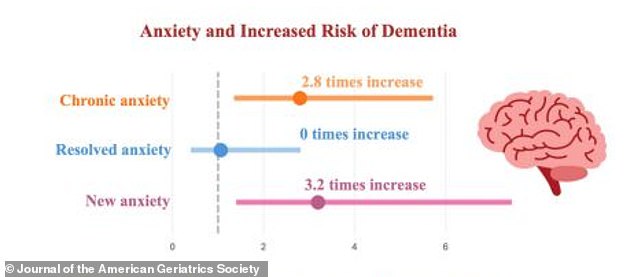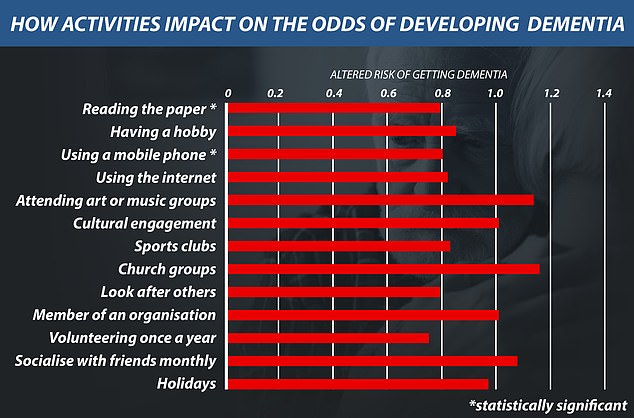It can leave people with their hearts racing and dreading work meetings.
But a new study has found that living with anxiety can also radically increase a person’s risk of developing dementia.
Adults over 60 diagnosed with anxiety in the past 10 years were about three times more likely to develop dementia than those without the condition.
And those diagnosed with anxiety before age 70 had even worse odds, being up to seven times more likely to develop dementia.
Researchers in Australia found that having chronic or new anxiety increased older people’s risk of developing dementia.

The graph above shows the average increase in risk of developing dementia based on chronic, resolved, or new anxiety.
The team believes this could be because patients with mental illness are more likely to engage in risky behaviours, such as smoking and poor diet, which have been shown to lead to dementia.
Some evidence also suggests that anxiety causes excessive levels of stress hormones, leading to inflammation in the brain that releases toxins and slows cognitive function, resulting in dementia.
The study adds to a growing body of research suggesting that mental health may be linked to cognitive decline.
The researchers wrote: “To our knowledge, this is the first study to assess the effect of anxiety persistence (chronic anxiety vs. resolved anxiety vs. new anxiety) and timing of anxiety exposure on dementia risk.”
‘These results suggest the possibility that anxiety is a modifiable risk factor for dementia and that timely management of anxiety helps reduce the risk of dementia.’
According to the National Institute of Mental Health, nearly one in five American adults suffers from an anxiety disorder, which equates to 40 million Americans.
The researchers evaluated 2,132 participants over the age of 60. The majority (53 percent) were women.
Most Australians included in the study had completed at least technical education and had a history of smoking.
On average, 62 percent of participants consumed one to four alcoholic drinks per week.
Patients were divided into three age groups: 60-70, 71-80 and 81+. The mean age of participants was 76 years.
Anxiety was measured once at baseline (wave 1) and again after five years (wave 2).
Patients with “chronic” anxiety showed symptoms at the beginning and end of the experiment, while those who were only anxious at the beginning had “resolved” anxiety. Patients who only showed symptoms toward the end had “new” anxiety.
During the 10-year study period, approximately three percent of participants developed dementia and seven percent died.
The researchers found that, on average, participants with chronic anxiety were 2.8 times more likely to develop dementia, and those with new anxiety were 3.2 times more likely.

Previous research has found that some social and intellectual activities may lower the risk of developing dementia.
However, the probability was higher among those under 70 years of age.
Patients aged 60 to 70 with chronic anxiety were 4.6 times more likely to develop dementia, a figure that rose to 7.2 times for those in that age group with new anxiety.
The team said this could be because having anxiety at a younger age has been shown to increase the risk of heart disease and other problems over time that have been linked to dementia.
But the study also showed that participants whose anxiety resolved between waves 1 and 2 were not at increased risk, showing that treatment through therapy and medication was effective in reducing risk.
“In our study, the risk of dementia among resolved cases was similar to that of those without anxiety,” the researchers wrote.
‘These findings support anxiety as a potential modifiable risk factor for dementia and point to the potential role of anxiety management in middle-aged and “young” older adults in reducing the risk of dementia later in life.’
Anxiety is usually treated with a combination of therapy, medications, and lifestyle changes, although each patient is different.
“People with anxiety are more likely to adopt unhealthy lifestyle habits, such as unhealthy diet, physical inactivity and smoking, which in turn can lead to cardiovascular disease, which is strongly associated with dementia,” the team wrote.
‘Therefore, there are plausible direct and indirect mechanisms by which anxiety may increase the risk of dementia.’
The study had several limitations, including the possibility of finding cases after the initial onset of the illness and the assessment of anxiety symptoms only within four weeks of each recording.
The team also had no information on how anxiety was resolved at the end of the experiment.
Researchers believe that lifestyle factors common in people with anxiety could explain the increased risk.
The study was published Wednesday in the journal Journal of the American Geriatrics Society.


